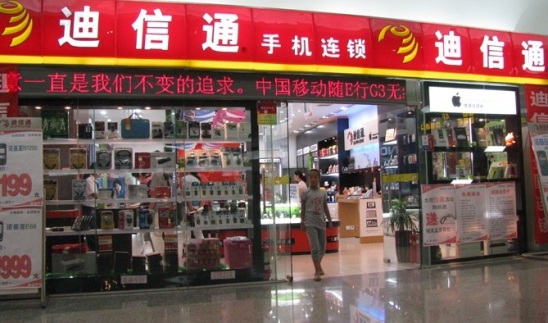
Private operators are finally set to enter China's telecom market following the issue of the first batch of MVNO licences.
After nearly a year of preparation, the Ministry for Industry and IT (MIIT) says it has approved trial licences for 11 companies who have signed wholesale agreements with China Telecom and China Unicom.
But missing from the fray is the market heavyweight, China Mobile, along with some of the country's biggest electronics retailers who had been expected to win MVNO licences.
Announcing the licences last Thursday, the MIIT said in a statement that China Mobile had identified a number of MVNO retail partners and was now in the “contract signing period.” But the statement confirmed the MIIT had not received any licence applications from Mobile partners.
Other reports said that China Mobile, which has 62% of the market, feels it has the most to lose from the entry of the new players and fears a price war.
By comparison, the two smaller operators have decided that the MVNO market could open up new retail channels for them. China Telecom appears especially enthusiastic. Of the 11 who have been awarded licences, nine are with China Telecom. Reportedly, China Telecom has signed up 16 MVNO partners and China Unicom 14.
As for China Mobile, Sina Tech has pointed out that at the MIIT's quarterly briefing in October, a senior official sent what was seen as a wake-up call, remarking that MVNO progress among the operators “is not the same.”
Apart from China Mobile's absence, the failure of major appliance chains such as Suning, Gome and Aisidi to gain a licence has also raised eyebrows. All of them have spoken enthusiastically about the MVNO business and are probably the strongest challengers to the cellcos. Suning, for example, has 8 million online customers, 1700 retail stores and a 3000-seat call centre.
The MIIT says all those who applied received a licence. Gome told Sina that its application was filed in December and the approval was now “advancing normally.” Industry insiders and a good number of posters on bulletin boards suspect that the big retailers are being held back because they will compete on price.
However, several retailers did receive licences, as did a number of tech firms. (The full list: retail chains Telephone World, Funtalk, Digitone and Telling, online mall JD.com, OSS/BSS provider SoShare, Alibaba’s domain registrar and web hosting firm HiChina, Tsinghua University-owned Huaxiang Telecom, mobile VAS and platforms firm Bewinner, online mobile recharge service provider Lianlian, and Busap, which provides TV services to trains and buses.)
The other and perhaps even bigger absence here is a framework that will allow MVNOs to compete. The ministry has merely stipulated that the wholesale price must be lower than the lowest retail price in the same geographical market. That doesn’t leave much of a margin.
Under the rules, MVNOs must lease their backhaul as well as access networks from incumbents.
So the entry of virtual operators is hardly likely to upset the status quo, especially as it coincides with arrival of 4G in which China Mobile has almost a one-year break on its rivals.
The importance of privately-owned MVNOs is thus mostly symbolic. Given China’s desperate need for basic telecoms infrastructure, it is possible private firms may eventually be allowed to invest directly in networks. But the door remains firmly shut on foreign telcos.
 Thursday, July 3, 2014 at 12:12PM
Thursday, July 3, 2014 at 12:12PM  Robert |
Robert |  Post a Comment |
Post a Comment |  MVNO in
MVNO in  Mobile China
Mobile China 

